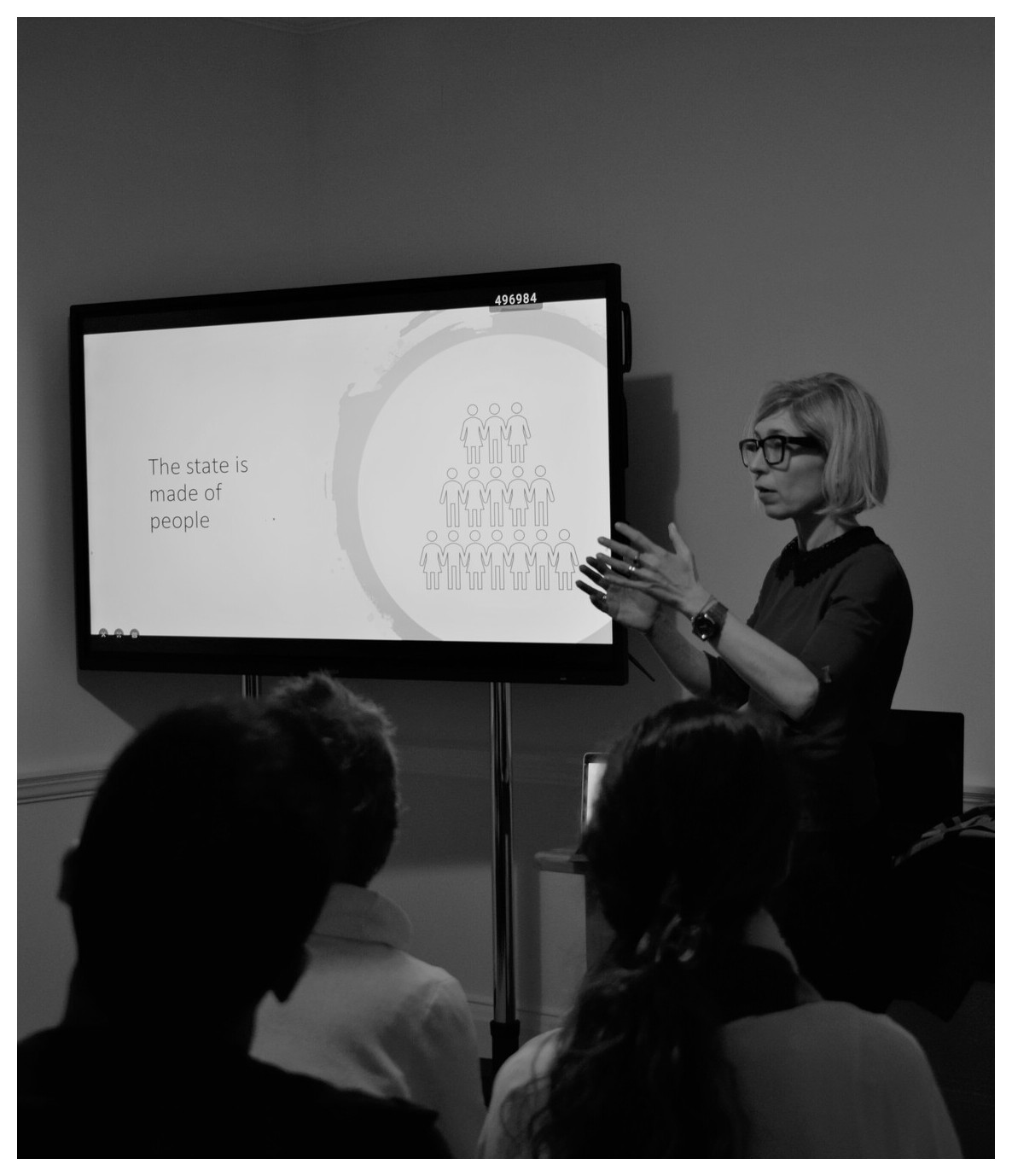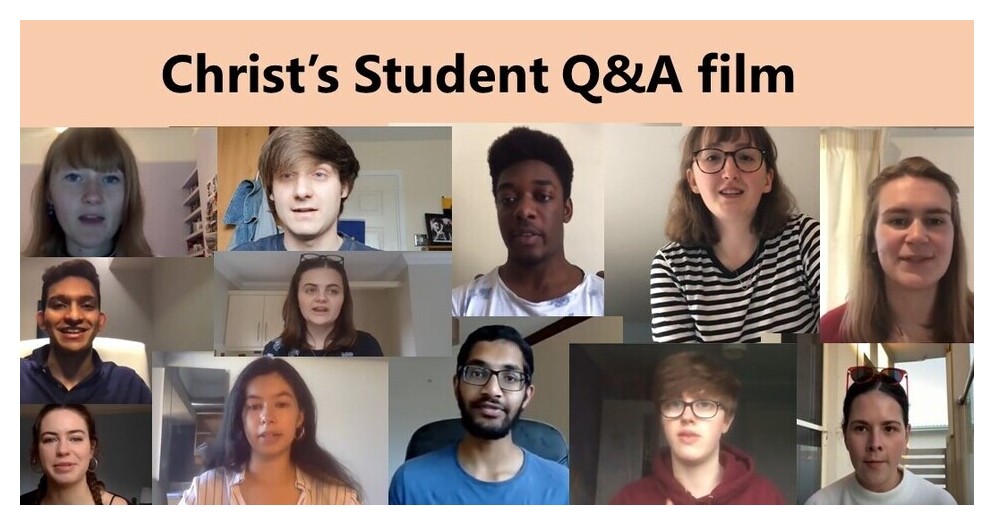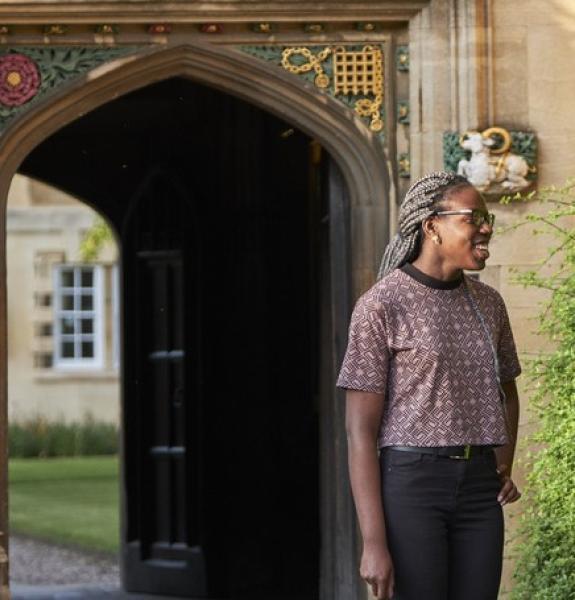Christ's has been an intellectual home to many successful Economics scholars, including Nobel Prize laureate James Meade (1907-1995).
Women in Mathematics Residential
As well as top-class teaching, you’ll find a friendly student community of around 20 undergraduates and 10 graduates in Economics each year. This makes it easy to get to know everyone, especially as we host regular lunches, dinners and drinks during the year. Our students tend to work together – a key factor in their exam success and satisfaction with Cambridge – so many keep in touch after graduation and return for social events.
Amongst other events, our bi-annual Meade Lectures in Economics bring world-leading economists to Christ's, and students often have the opportunity to enjoy an informal lunch with the speakers.

We are lucky to have students from all over the world: alongside British nationals our current group of Economists includes students from Australia, China, Finland, Germany, Russia, Singapore and Spain. Our students' performance in economics has been consistently outstanding. Over the last ten years Christ's students have achieved on average the highest scores for economics across the University.
Some of our graduates move on to further study at top universities across the globe, including, most recently, the LSE, Stanford and Yale. Many join management consultancies (Goldman Sachs, UBS, KPMG Strategy&, Bane) investment banks (Deutsche bank, Goldman Sachs, Macquarie) and economics consultancies (RBB, Frontier Economics). A number of students go on to work in governments, central banks and international organisations.
The Economics course (or ‘tripos’) is a three-year degree. From second year on you can study particular areas in greater depth, and in the final year you write a dissertation on your chosen topic.
Please visit the University website for full details of the Economics course content and structure. including the course film. You will also find information on the Faculty of Economics page for prospective applicants. If you have any further questions about the course content, please contact ugadmit@econ.cam.ac.uk.
Teaching in Economics at Christ's is traditionally very strong and maintained by our academic economists:
> Professor Sanjeev Goyal, FBA, Social and economic networks.
> Dr Puru Gupta, macroeconomic theory, financial economics, corporate finance, economics of strategy, probability, and game theory
> Dr William Peterson, Applied econometrics, macroeconomic modelling, input output analysis and energy economics
> Dr Julia Shvets (Director of Studies) Applied microeconomist
As well as lectures organised by the University, you have weekly ‘supervisions’ at the College arranged by Director of Studies Dr Julia Shvets. These small-group tutorial sessions give you the advantage of personally-tailored tuition and guidance.
Read about the experiences of Olivia, Martin, Sanchit and Luke who recently studied Economics at Christ’s.
If you’d like to hear from other Christ's students, please watch the Christ's student Q&A film, and visit our Student Profiles page.

The location is super convenient, just as I’d hoped – if I’m meeting friends from other Colleges, we tend to meet at Christ’s because it’s in the middle of all of our Colleges, which is really practical for me. Lectures aren’t far away at all, and the Economists in my year usually end up walking as a group to our lectures.
How to apply
Visit How to Apply for full details and a timeline of the application process. We welcome applicants from all backgrounds and school types, all over the world. If you're applying from outside the UK, please read our international students section.
News
> If you are taking A levels (not including Singapore A levels), note that Further Mathematics is a required subject for applicants to Christ's. Please read the subject requirements below for more information.
> All Economics applicants must take the TMUA (Test of Mathematics for University Admission). Please see the TMUA section below for dates and further details. We recommend that you register at the first opportunity once registration is open.
> We do not ask applicants for Economics to upload essays as part of the application process.
Economists have found that mathematical modelling provides a useful tool in analysing trade-offs faced by individuals and societies. It allows us to precisely articulate the assumptions we make about people's behaviour, and to test our hypotheses on data. Hence, the central requirement for admission to Cambridge's Economics programme is fluency in basic mathematical and statistical methods. At Christ's we will require an A* in A-level Mathematics, a Grade 7 in IB Higher Level Mathematics (Analysis and Approaches), or an equivalent performance in other Mathematics qualifications.
In addition, if you are taking A-levels (except Singapore A levels), we require you to take Further Mathematics. If your school doesn't offer Further Mathematics, you may be able to get support from the Advanced Mathematics Support Programme to take this. A number of our international candidates (from countries where you study a wide range of subjects at school in the final two years) take part in Mathematics competitions as a way to focus on extending mathematical knowledge and ability, IB students are welcome with Higher Level Mathematics Analysis and Approaches (see the maths note on our IB page) and applicants from Scotland should see this page.
We do not require candidates to have studied Economics at school. However, applicants should have a vivid interest in Economics as a discipline and the questions it poses about individuals, organizations and societies.
We encourage students to attend one of our regular Subject Matters webinars for help with choosing Post-16 subjects for competitive university applications. This webinar is pitched for students aged 14-16 though it is also possible to attend when you have started sixth form.
Alongside A-level and International Baccalaureate students, we welcome applications from students enrolled in other programmes. In recent years, we have admitted a number of people who studied for the German Abitur, Singapore A levels, and other international qualifications, and we have dedicated sections for applicants from Scotland and international applicants.
If you have any concerns about the subject requirements for Economics in relation to your school subjects, it would also be a good idea to read Exploring courses: Economics.
All applicants for Economics at Cambridge must sit a computer-based assessment called the Test of Mathematics for University Admissions (TMUA). This is the same at all Cambridge Colleges.
TMUA October 2026: Dates will be confirmed on the UAT UK website from May 2026. Account set-up normally opens in June, with registration deadlines in September and the test date in October. You must use the October sitting in the year you apply (no other sitting is accepted). |
You take the TMUA in person at a Pearson Vue Test Centre. There are test centres in countries all over the world. Please read the TMUA summary and then look at the ESAT-TMUA website for full details, including preparation information, how to register and book your test, and details for UK applicants in financial need and students who have access requirements for a disability.
There is no set score that we are looking for and we don't expect you to get every question right. The TMUA forms part of our holistic admissions process, which means that we will look at your scores in the context of your whole application.
If we select you for interview, these take place in early December. At Christ's we do all of our interviews online, on Microsoft Teams. You can have your interviews either at home (most applicants do this) or at school (if easier).
Those selected for interview are interviewed for 35-50 minutes in total. At Christ's we normally divide this time into two interviews.
The aim of the interviews is to try to determine each applicant's potential to benefit from the Economics Tripos. The interviews have no fixed format but typically one of them includes working through some applied quantitative problems and the other involves reading a short article and discussing it.
Further, more general information about interviews (including two useful films) is available in the Cambridge interviews section, and it's worth also having a look at supervisions (short film here), as interviews are similar to what you do every week as a Cambridge student.
You need to be academically ambitious. We define the terms of each offer individually, but a typical offer for Economics is
> A*A*A at A-level, including A* in Mathematics
> 42 points overall in the International Baccalaureate with 7,7,6 in relevant Higher Level subjects, including 7 in Higher Level Mathematics (Analysis and Approaches)
> A1, A1, A2 in three relevant Scottish Advanced Highers, including A1 in Mathematics (See the Economics from Scotland page in our Applying from Scotland section)
You need to be academically ambitious: the majority of Christ's students arrive with higher grades than are required.
If you're taking another qualification, we expect you to be working at or close to the top of the mark range i.e.
> Baccalauréat français international (BFI): 17 (mention très bien) out of 20 overall, with a minimum of 17 in relevant subjects including Mathematics
> European Baccalaureate: at least 85% overall, with 9/10 in relevant subjects including Mathematics
You can look up other qualifications in the offer levels for other exam systems and international entry requirements, and if you are applying from outside the UK please read the Christ's international students section for further information and check the country pages.
If you will have finished school when you apply, please also read about post-qualification applications, taking a gap year, and, if relevant, mature students or applying from a university.

When we assess your application, it will be impressive if, as well as doing well at school, you are developing your relevant skills (e.g. maths) and interest in Economics further by going beyond your school curriculum. Here are a few resources and suggestions which may be helpful, and we recommend that you explain how you have developed your skills and interest in the subject in your UCAS personal statement.
> TMUA preparation materials. There is also an archive of old TMUA papers to help prepare.
> Advanced Mathematics Support Programme (support for A level Mathematics and Further Mathematics).
> A level Mathematics and A level Further Mathematics
> Resources for self-study; Further Maths Fact Sheet; free Further Maths videos.
> Christ's Economics Taster session (using Maths to understand human beings, given by Dr Julia Shvets.
> Imperial College London A level Further Maths skills course (this is support but cannot replace the qualification)
> NRICH Maths for Economics (Mathematics problems with an economic flavour or application)
> Freakonomics (Economic analysis website in which economic theory is used to explore a very wide range of topics)
including this episode on barriers to changing your mind with Dr Julia Shvets
> Plus Magazine (Articles and podcasts on any aspect of mathematics)
> Statistics: More or less (Radio 4); How to make the world add up (filmed talk) Spiegelhalter, D (2019); The Art of Statistics, Pelican books
> 3Blue1Brown Youtube (e.g. Exponential growth and epidemics and Simulating an Epidemic) - there's also a website.
> What Economists really do (Royal Economics Society talk with Prof Oriana Bandiera)
> The Economist (Weekly publication on international news, politics, business, finance, science, technology and the connections between them. History and further information)
> VMACS (Virtual Macro Seminar Series)
> HE+ Economics (Website for secondary school students) / Discover Economics (for 15-17 year olds)
> Economics blogs: Blog introduction lists such as this one will help you find interesting material (e.g. Greg Mankiw, Tim Harford)
> Economy (Website aiming to make economic discussion accesible for all)
> Essay competitions e.g. Young Economist of the Year
> CamGuides (academic and information skills / how and where you would be working)
> The Economics dissertation (Information and example of the final year dissertation)
I was positively surprised by the amount of communication by the admissions team – they kept us up to date with relevant deadlines and the stage of the process they were at on the dedicated website page which helped to calm my nerves and made for a smoother process.
Open Days and Online Events
> Open days and events page
> College Open Days
> Regular webinars
> Subject meetings (May)
> Economics events in the Cambridge Festival
> Subject Masterclasses
> Economics-specific talks in the July Cambridge Open Days.
If you are a UK student from a background where there is little tradition of entry to Higher Education, you can apply to attend a Sutton Trust Summer School in Economics or to shadow a current Economics undergraduate via the Cambridge SU Shadowing Scheme.
For a fuller picture of what the course involves, take a look at Undergraduate Economics admissions on the University website and read the Faculty of Economics information for prospective students too.
If you have any queries, please send them to admissions@christs.cam.ac.uk and we’ll help however we can.



